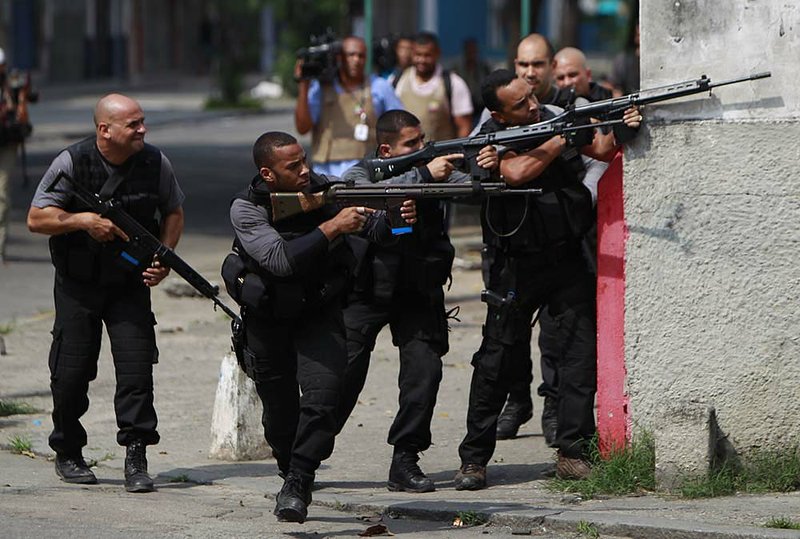RIO DE JANEIRO, Brazil — Elite police units in borrowed navy tanks rumbled through a heavily fortified slum Thursday in an effort to apprehend drug-gang leaders they blame for five days of widespread violence, even as scores of armed youth fled to a neighboring shantytown.
Authorities said gang members who hide out in numerous shantytowns have erected roadblocks on major highways to rob motorists en masse, torched more than 40 cars and buses, and shot up police outposts, all to protest against a security program that has been pushing them from slums where they’ve held sway for decades.
The officers arrived in the Vila Cruzeiro shantytown under the cover of police helicopters and amid the rattle of high-caliber gunfire despite the gang members’ efforts to block access with burning vehicles.
As police entered, scores of gangsters were seen fleeing down jungle-covered hills, across an area known as “the green hell,” to a neighboring gang stronghold, the Alemao slum.
Businesses in the neighborhood shut down, and officials sent 12,000 students home from 10 schools and a day-care center in the region, the city’s education department said in a statement.
Thursday’s push into Vila Cruzeiro and other shantytowns in the city left eight people dead and one police officer wounded, authorities said. Police arrested 11 men, and seized gallons of gasoline and sticks of dynamite.
Since late Sunday, authorities have arrested more than 150 suspects in police raids at nearly 30 shantytowns in the northern and western parts of Rio. At least 23 people have died, many of them suspected gang members, though policemay not have accounted for all of those killed in Thursday’s operation.
Getulio Vargas state hospital, located at the bottom of the hillside covered by the sprawling Vila Cruzeiro, took in 23 injured people in 24 hours, said Rio state Health Department spokesman Valeria Bravo.
The police raids are part of the government’s effort to clean up the seaside city before it hosts the World Cup in 2014 and the 2016 Olympics. Over the past two years, authorities have established permanent police posts in 13 slums as part of an effort to deliver basic services to the communities and rid them of drug trafficking-related violence.
A member of the elite BOPE police unit who would only give his last name, Malta, waited Thursday for his turn to go into Vila Cruzeiro, passing the time eating salted peanuts and drinking Coca-Cola.
“The idea is to go in and take control,” said Malta, assault rifle strapped across his chest, his face smudged with black camouflage paint. “We can’t live like this, with these people threatening our families. It’s zero tolerance now.”
Several residents of the hillside community sat on the steps of shuttered storefronts, unable to go back home and unsure when their lives would return to normal.
“What am I going to do? I can’t go to work, I can’t go home,” said Maria das Gracas Fonseca, who works cleaning houses in an affluent neighborhood on the city’s south side. Sitting next to her in the shade were her 7-year-old son and 8-year-old daughter. They had no school Thursday, and no one to take care of them, Fonseca said.
“I need the work, but my children are more important,” she said. “I don’t even know where we’ll sleep tonight, but I will be with them.”
Police have not released the identities of all those killed in the five days of clashes, but spokesman Henrique de Lima Castro Saraiva did acknowledge Wednesday that “bystanders would be affected” by the battles.
The oldest patient taken in by Getulio Vargas hospital during the conflict was an 81-year-old who’d been grazed by a bullet, and the youngest was a 10-year-old child hit with grenade shrapnel, Bravo said.
Four other city hospitals suspended non-emergency surgeries so they could take in victims of the shootouts between gang members and police, she said.
Bus companies removed 115 vehicles from service Thursday for safety reasons, while gang members stopped and burned 11 others, said the Federation of Bus Companies of Rio, Fetranspor.
Rio state Public Safety Director Jose Beltrame told CBN radio that the military carriers were only the “first dose” of support that Brazil’s military would lend to Rio’s police force. He did not elaborate on future plans, saying he didn’t want to put his men or citizens at risk.
Front Section, Pages 6 on 11/26/2010
